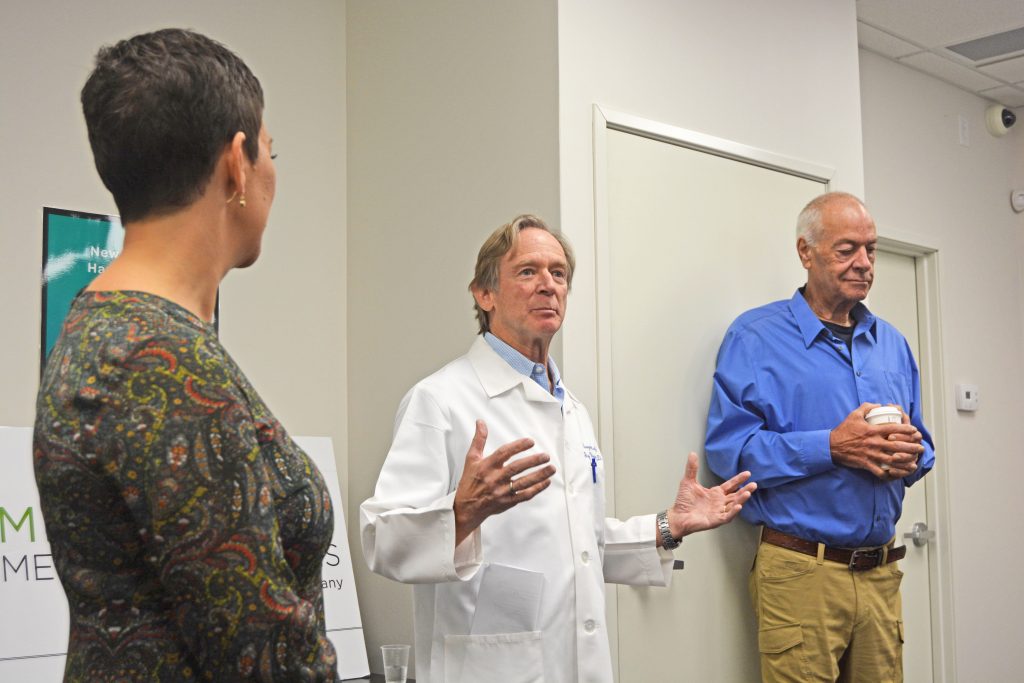
Dr. Joseph Westwater (center) explains the benefits of medical cannabis at a press briefing last Thursday at Minnesota Medical Solutions Moorhead clinic. Patients Amy Wieser Willson (left) and Mike Walters (right) look on. (Photo/ Bryce Haugen)
Bryce Haugen brycevincenthaugen@gmail.com
Military veteran Mike Walters was plagued by post-traumatic stress disorder and anxiety for much of his life.
“I was just hair triggered,” the Osage man said. “I didn’t enjoy life at all.”
Within 15 minutes of taking oil containing CBD, one of the active ingredients in marijuana, his anxiety went away, he said.
Walters was one of two medical cannabis patients who shared their stories at a press briefing last Thursday at Minnesota Medical Solutions’ (MinnMed) Moorhead office located at 104 7th Street South.
Minnesota has one of the most restrictive medical cannabis laws in the country; it doesn’t allow the smoking of raw plant material, but rather patients are given doses of capsules, oils, topicals and tinctures. Doctors can prescribe cannabis for a limited number of conditions, including cancer, glaucoma, HIV/AIDS, Tourette’s syndrome, Amyotrophic lateral sclerosis (ALS), seizures, muscle spasms, inflammatory bowel disease, terminal illnesses, intractable pain, autism spectrum disorders, obstructive sleep apnea and post-traumatic stress disorder (PTSD).
MinnMed is one of two companies in Minnesota licensed to formulate and distribute medical cannabis. Besides Moorhead, it has locations in Minneapolis, Rochester and Bloomington.
“Medical cannabis is not a miracle cure,” said MinnMed CEO Dr. Joseph Westwater. “That’s why Minnesota’s program is one of the safest in the nation.”
So far, about 17,000 patients are certified statewide, with growth slow but steady. As it stands now, insurance doesn’t cover the treatment. On average, it costs between $100 and $200 per month.
The Moorhead clinic serves about 400 people, with the most common conditions treated being chronic pain and PTSD. Based on estimates from similar sized states with medical cannabis, such as Colorado, up to 100,000 Minnesota might qualify for the treatment, Westwater said.
“Most of the people will have good results,” he said. “This is in large part a patient-driven success story.”
Westwater said medical cannabis has been proven to be a good alternative to opioids, which is huge considering the epidemic that has cost hundreds of lives statewide each year. It also reduces the need for benzodiazepines and sleeping pills, he said.
“There’s an ocean of pills out there waiting to do damage,” he said. “Changing prescription habits are a big part of the opioid action plan under Gov. (Mark) Dayton’s administration.”
Iraq War vet Amy Wieser Willson, a Moorhead resident, refused to take opioids for her chronic pain, having lost two friends to the drugs. But the symptoms of her fibromyalgia, osteoarthritis and bone degeneration made it difficult to get out of bed and even her sheets caused pain, she said. For 14 years, she searched for relief, eventually finding it through medical cannabis.
“It’s hard to fathom how much of a miracle this truly is – to sleep through the night,” Wieser Willson said.
She said there’s a stigma associated with medical cannabis that needs to be fought.
“I’m not pounding bags of potato chips every night,” she said. “This is very different. Medical cannabis saves lives.”
The solution to stigma, Walters said, is education.
“I would rather have people feeling better today than to think, I should have done that three years ago,” he said.
Westwater said medical cannabis, for most patients, means a better quality of life.
“I have patients that say ‘thank you, I got my life back because of this medicine,’” he said.


